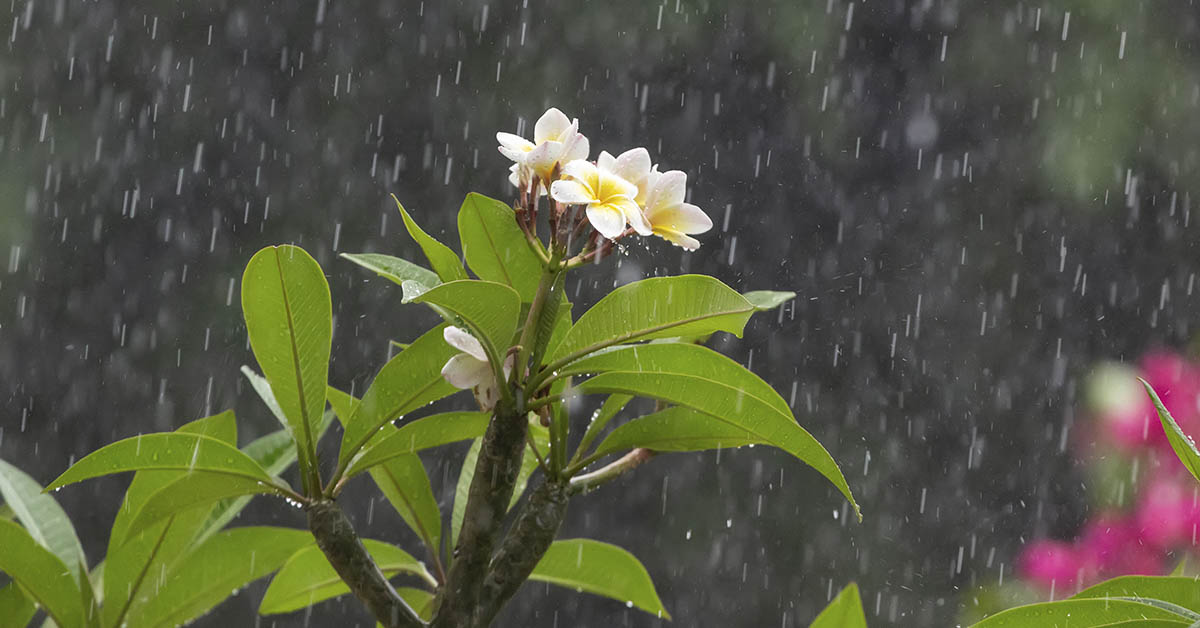Have you ever noticed a unique smell hanging in the air before a rain shower? That distinct smell, often described as earthy, sweet, or musky, isn’t just a figment of your imagination. It’s a real phenomenon, grounded in chemistry and microbiology, and it has a captivating story. Let’s take a quick look at our ability to smell rain:
The Complex Chemistry Behind the Rain’s Scent
This distinct aroma is due to three main chemical processes: petrichor, ozone generation, and geosmin production.1 Petrichor is the term used to describe the smell produced after rain falls on dry soil or rocks. The post-rain smell comes from airborne organic molecules mixing with mineral surfaces. When it doesn’t rain for some time, these molecules mix with other elements on a rock’s surface, releasing a combination of things that make up petrichor.2
The second chemical process involved in this unique pre-rain scent is the inclusion of ozone. During a thunderstorm, the electrical charges can heat oxygen and nitrogen molecules in the atmosphere, which then can recombine into O3, ozone. Ozone has a sharp, pungent scent and is often described as akin to fresh linen.³ This smell is typically associated with the electricity-charged atmosphere of stormy weather rather than light rain.

The third component to complete the smell of rain is geosmin, a metabolic by-product of certain bacteria known as actinomycetes. These bacteria release spores when the soil is dry, and these spores produce geosmin. When it rains, the spores are disturbed, and the geosmin is released into the air, contributing to that unmistakable, earthy smell. This complex network of bacterial action and chemical reactions comes together to create the scent we associate with the approach of a rainstorm.
While the combination of petrichor, ozone, and geosmin creates that signature rain scent, it’s worth mentioning that not everyone can smell these components. Our sensitivity to these smells can vary due to factors like age, genetics, and overall health. For instance, some people may detect the smell of ozone quite keenly, while others might be more attuned to geosmin’s earthy aroma. It’s a testament to human sensory perception’s incredible diversity and adaptability.
Impending Showers
In the end, the capacity to “smell rain” is a wonderful demonstration of the complex interplay between atmospheric chemistry, microbiology, and sensory perception. It showcases our intimate connection with nature, as we can sense changes in the atmosphere that signal coming rainfall. More than just an intriguing sensory experience, this phenomenon also bears ecological implications, playing a crucial role in the life cycles of plants and microorganisms.
In the wild, the scent of rain can trigger various behaviors in animals, from earthworms emerging from the soil to certain species of desert frogs laying their eggs in anticipation of the coming moisture. It’s a signal that permeates the fabric of ecosystems, guiding the rhythms and patterns of life in tune with the planet’s hydrological cycle.
The Power of Our Sensory Connection
Being able to detect the imminent arrival of rain is just one of the many ways our senses connect us to the natural world around us. Many of these sensory links are subtle, often occurring subconsciously, and yet they significantly shape our experiences and interactions with the environment. From the warmth of the sun on our skin to the sound of leaves rustling in the wind, our senses are constantly attuning us to the changing conditions of our surroundings.
While technological advancements have brought comfort and convenience, they often detach us from these sensory connections to the natural world. The ability to “smell rain” reminds us that we are biological beings, inherently linked to the planet’s rhythms. In the hustle and bustle of modern life, taking a moment to tune in to these sensory connections can be a powerful grounding experience, bringing a sense of calm and interconnectedness.
More Than Just a Scent
As we’ve explored, the ability to smell the impending rain is more than just a curious quirk of human perception. It’s a multifaceted phenomenon that encompasses biology, chemistry, and the complex capabilities of the human system. It’s a testament to the intricate and interwoven nature of life on Earth, where everything is connected in a delicate balance.
Beyond our personal experience, this pre-rain scent plays essential roles in various ecosystems, affecting the behavior of various creatures and contributing to the cycle of life. The smell signals that the arid period is ending, a time when plants can grow and animals can find more food and water. It triggers the breeding patterns of some species and the hibernation of others. The smell of rain is, in essence, a signal of life’s resurgence after a period of dryness.
So, can you smell the rain? Absolutely, thanks to the unique blend of petrichor, ozone, and geosmin. It’s not a surefire way to predict the weather, but it is a small reminder of our deep and profound connection with the world around us. It’s a sensory cue highlighting the incredible interplay of scientific processes that shape our world and our experience here on Earth. The ability to smell the imminent rain isn’t just about predicting the weather – it’s a small yet profound reflection of our deep connection with the natural world and the intricate web of life that sustains us all.
Keep Reading: Scientist says the existence of an afterlife is impossible
Sources
- “Can You Smell When The Rain Is Coming?” IFL Science. Dr. Russell Moul. May 12, 2023
- “Storm Scents: It’s True, You Can Smell Oncoming Summer Rain.” Scientific American. Daisy Yuhas. July 18, 2012.
- “Fact or Fiction: Can we really smell when it is going to rain?” Rochester First. April 28, 2021

